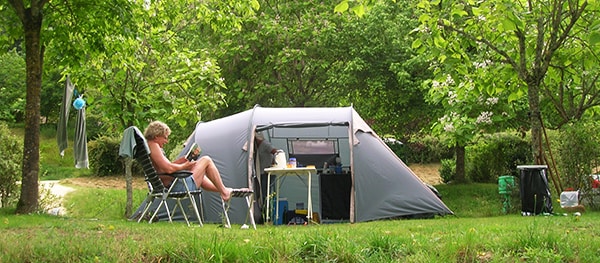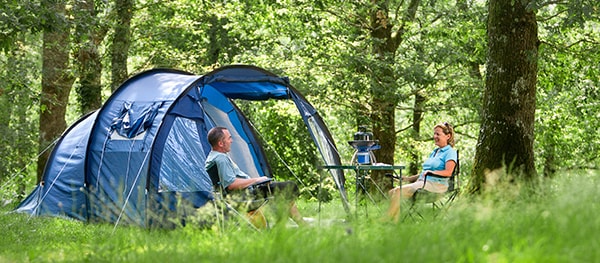This is how to maintain your tent
28 July, 2017
If you buy a tent, you obviously want to use it for as long as possible. In particular, the tent fabric has to endure quite a lot, regardless of whether the sun is shining, or it’s raining. And what about the zips? With a little preparation, and some care and attention at the campsite, you can be sure you’ll be able to use your tent again the next time you go camping.
We’ve organised the following tips for proper maintenance of your tent into different moments. That’s because if you care for your tent before, during, and after you use it, you can even extend its lifetime.
Departure with a complete tent
Did you forget to clean the tent when you came back from your last holiday? In that case, make sure you inspect your tent carefully before you leave home. Once you arrive at your camping destination, it’s handy to just be able to put up your tent, without having to inspect it first. Is everything complete, or are there broken seams or zips? Are there any holes in the fabric? If you do this check a couple of weeks before your holiday, there’ll still be time to do any repairs. This will prevent you having to try to get your tent fixed using your best French, Polish or Portuguese.

At the campsite: preventing damage
What does the ideal camping pitch look like for you? Before you grab your tent poles out of their bag in all your enthusiasm, there are a couple of things to bear in mind.
- Is your pitch in a woody area? Then don’t be surprised if you get a dollop of bird droppings, or a stain of stubborn resin on your canvas. Not a disaster, but it is best to clean it as soon as it’s dry. That’s because it can make your canvas more vulnerable to further damage. When cleaning, don’t use soap.
- Long-term camping in full sunshine will cause the quality of the canvas to deteriorate. Only cotton is well-protected against this kind of damage.
- Is the weather forecast uncertain? In that case, don’t pitch your tent on the lowest part of the campsite. If it rains, the water will flow directly towards your tent.
- Check if there are stones, pine cones, roots or other sharp objects in the way that might damage your groundsheet. It’s always a good idea to bring an extra groundsheet with you. Not just for extra protection for your tent’s groundsheet, but also, in case it’s cold, an extra groundsheet will provide some insulation.
- Check if the zips are closed before you start to pitch your tent, otherwise there will be too much pressure on them.
- Make sure that the canvas is well stretched on all sides. If the canvas is tight, there’s less chance it will leak.
Tips for using your tent
Your tent ensures the most when you are using it. In order to enjoy your tent for longer, there are a couple of tips that will help you prevent unnecessary maintenance.
- Doing the washing up: typically, a chore that no one can escape. Often, there are washing facilities where you can do the washing up. And that’s good, too, because if you wash up in the tent, condensation can lead to the formation of mould. Indeed, the condensation from washing up or hand washing clothes is even more dangerous because of the soap that is used. It can impair the water resistance of the canvas. If nothing else is possible, do ensure good ventilation. The same goes for cooking in your tent, which you should also try to avoid.
- Either fully open, or fully close the zips. Otherwise you can overload the zip, and it’ll break faster.
- Don’t put anything against the canvas on the inside of the tent. You’re asking for leakage.
- Don’t hang your laundry or damp towels in or over the tent. The soap residue can impair the water resistance of the canvas.
- Don’t put chairs outside leaning against the tent. They will rub against the canvas and make it thinner.
Cleaning and packing your tent when you leave
What a shame, time to go home. Take some time to make sure your tent goes into your car well-cared for.
- If it’s possible, pack a clean, dry tent. Bring a soft brush with you to remove sand and dust.
- Make sure all the zips are closed when you’re packing the tent up. If you leave them open, the teeth might damage the canvas.
- Pack pegs and tent poles separately from the canvas. Here too it’s the case that sharp edges or points could tear the canvas.
Maintenance on your return home
Especially if you’ve left the campsite in wet weather, speed is necessary when you return home. Once you’ve done the necessary maintenance on your tent, you can start planning your next camping holiday!
- Dry everything properly. If you wait too long, the tent might get damaged.
- Are there patches of mould or mildew on the inside or outside of the canvas? Don’t panic. Get to work with a soft brush or a sponge with lukewarm water. If that doesn’t work, you can buy special cleaners for tent canvases. Don’t use washing up liquid. That’s because it leaves a greasy layer on the canvas, even after you’ve rinsed it well. That’s something that fungi and algae love.
- To maintain water resistance and prolong the life of your tent, treating it with a waterproofing agent from time to time isn’t a bad idea. If your tent is made from nylon or polyester, you can treat the seams regularly with a seam seal. That prevents water getting in through the seams. If you have a cotton tent, you can get the leaking seams impregnated. Then they’ll be watertight again.
- Replace any parts that have broken before you start looking at your holiday snaps. Then you won’t have to remember to do that next year.
- Store your tent in a cotton bag. Synthetic fabrics don’t ventilate well. Store your tent in a dry room if possible.
What’s your secret for maintaining your tent?
Are you an avid tent camper, and do you have more handy maintenance tips? Share them here!
Want to stay informed with fun and useful camping news? Then sign up for the Eurocampings newsletter!












Latest comments